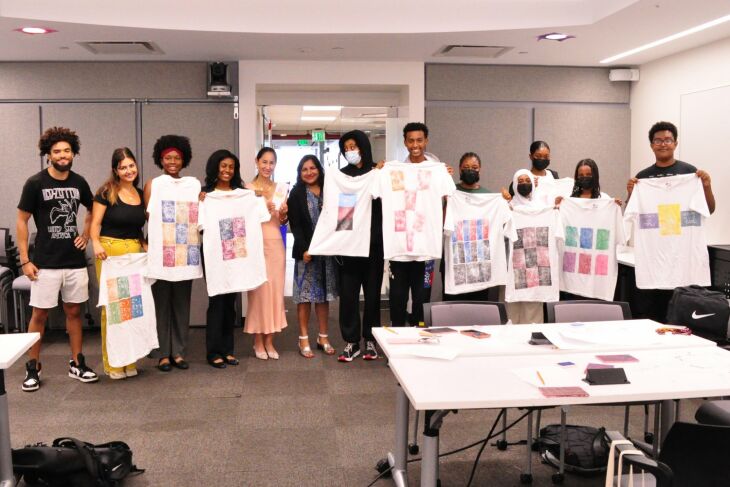For over 40 years, the Mayor's Summer Youth Employment Program (MSYEP, or the Mayor’s Program) in Cambridge, Massachusetts, has been providing teenagers with their first work experience, but 2022 brought a new offering. Collaborating with MIT’s Personal Robots research group (PRG) and Responsible AI for Social Empowerment and Education (RAISE) this summer, MSYEP created a STEAM-focused learning site at the Institute. Eleven students joined the program to learn coding and programming skills through the lens of “Data Activism.”
MSYEP’s partnership with MIT provides an opportunity for Cambridge high schoolers to gain exposure to more pathways for their future careers and education. The Mayor’s Program aims to respect students’ time and show the value of their work, so participants are compensated with an hourly wage as they learn workforce skills at MSYEP worksites. In conjunction with two ongoing research studies at MIT, PRG and RAISE developed the six-week Data Activism curriculum to equip students with critical-thinking skills so they feel prepared to utilize data science to challenge social injustice and empower their community.
Rohan Kundargi, K-12 Community Outreach Administrator for MIT Office of Government and Community Relations (OGCR), says, “I see this as a model for a new type of partnership between MIT and Cambridge MSYEP. Specifically, an MIT research project that involves students from Cambridge getting paid to learn, research, and develop their own skills!”
Cross-Cambridge collaboration
Cambridge’s Office of Workforce Development initially contacted MIT OGCR about hosting a potential MSYEP worksite that taught Cambridge teens how to code. When Kundargi reached out to MIT pK-12 collaborators, MIT PRG’s graduate research assistant Raechel Walker proposed the Data Activism curriculum. Walker defines “data activism” as utilizing data, computing, and art to analyze how power operates in the world, challenge power, and empathize with people who are oppressed.
Walker says, “I wanted students to feel empowered to incorporate their own expertise, talents, and interests into every activity. In order for students to fully embrace their academic abilities, they must remain comfortable with bringing their full selves into data activism.”
As Kundargi and Walker recruited students for the Data Activism learning site, they wanted to make sure the cohort of students — the majority of whom are individuals of color — felt represented at MIT and felt they had the agency for their voice to be heard. “The pioneers in this field are people who look like them,” Walker says, speaking of well-known data activists Timnit Gebru, Rediet Abebe, and Joy Buolamwini.
When the program began this summer, some of the students were not aware of the ways data science and artificial intelligence exacerbate systemic oppression in society, or some of the tools currently being used to mitigate those societal harms. As a result, Walker says, the students wanted to learn more about discriminatory design in every aspect of life. They were also interested in creating responsible machine learning algorithms and AI fairness metrics.
A different side of STEAM
The development and execution of the Data Activism curriculum contributed to Walker’s and postdoc Xiaoxue Du’s respective research at PRG. Walker is studying AI education, specifically creating and teaching data activism curricula for minoritized communities. Du’s research explores processes, assessments, and curriculum design that prepares educators to use, adapt, and integrate AI literacy curricula. Additionally, her research targets how to leverage more opportunities for students with diverse learning needs.
The Data Activism curriculum utilizes a “libertatory computing” framework, a term Walker coined in her position paper with Professor Cynthia Breazeal, director of MIT RAISE, dean for digital learning, and head of PRG, and Eman Sherif, a then-undergraduate researcher from University of California at San Diego, titled “Liberty Computing for African American Students.” This framework ensures that students, especially minoritized students, acquire a sound racial identity, critical consciousness, collective obligation, liberation centered academic/achievement identity, as well as the activism skills to use computing to transform a multi-layered system of barriers in which racism persists. Walker says, “We encouraged students to demonstrate competency in every pillar because all of the pillars are interconnected and build upon each other.”
Walker developed a series of interactive coding and project-based activities that focused on understanding systemic racism, utilizing data science to analyze systemic oppression, data drawing, responsible machine learning, how racism can be embedded into AI, and different AI fairness metrics.
This was the students’ first time learning how to create data visualizations using the programming language Python and the data analysis tool Pandas. In one project meant to examine how different systems of oppression can affect different aspects of students’ own identities, students created datasets with data from their respective intersectional identities. Another activity highlighted African American achievements, where students analyzed two datasets about African American scientists, activists, artists, scholars, and athletes. Using the data visualizations, students then created zines about the African Americans who inspired them.
RAISE hired Olivia Dias, Sophia Brady, Lina Henriquez, and Zeynep Yalcin through the MIT Undergraduate Research Opportunity Program (UROP) and PRG hired freelancer Matt Taylor to work with Walker on developing the curriculum and designing interdisciplinary experience projects. Walker and the four undergraduate researchers constructed an intersectional data analysis activity about different examples of systemic oppression. PRG also hired three high school students to test activities and offer insights about making the curriculum engaging for program participants. Throughout the program, the Data Activism team taught students in small groups, continually asked students how to improve each activity, and structured each lesson based on the students’ interests. Walker says Dias, Brady, Henriquez, and Yalcin were invaluable to cultivating a supportive classroom environment and helping students complete their projects.
















